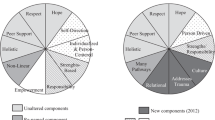Abstract
The Working Alliance Inventory was used to measure the strength of the therapeutic relationship between seriously mentally disabled case management clients and their case managers in a randomized trial of consumer-provided case management services. It was found that while there was no difference in the strength of the alliance between the consumer and nonconsumer teams of case managers, there were positive relationships between alliance and some outcomes, including quality of life, symptomatology, attitudes toward medication compliance, and satisfaction with mental health treatment.
Similar content being viewed by others
References
Ralph R, Clary B: The Working Alliance Inventory: Measuring the relationship between client and case manager. Paper presented at the National Conference on State Mental Health Agency Services Research, Baltimore, MD, October, 1992.
Neale MS, Rosenheck RA: Therapeutic alliance and outcome: Case manager-client relationships in intensive psychiatric community care. Poster presentation at 44th Institute on Hospital and Community Psychiatry, Toronto, October, 1992.
Frank A, Gunderson JG: The role of the therapeutic alliance in the treatment of schizophrenia.Archives of General Psychiatry 1990; 47:228–236.
Goering P, Wasylenski DM, Farkas M, et al.: What difference does case management make?Hospital and Community Psychiatry 1988; 39:272–276.
Goering P, Stylianos S: Exploring the helping relationship between the schizophrenic client and rehabilitation therapist.American Journal of Orthopsychiatry 1988; 58:271–279.
Gaston L: The concept of the alliance and its role in psychotherapy: Theoretical and empirical considerations.Psychotherapy 1990; 27:143–153.
Bordin ES: The generalizability of the psychoanalytic concept of the working alliance.Psychotherapy 1979; 16: 252–260.
Hovarth A, Greenberg L: Development and validation of the working alliance inventory.Journal of Consulting and Clinical Psychology 1989; 36:223–233.
Stylianos S, Goering P: The working alliance inventory: Reliability and validity in the context of rehabilitation for clients with chronic psychiatric disorders. Paper presented at the annual meeting of the Society for Psychotherapy Research, Toronto, 1989.
Endicott J, Spitzer R, Fleiss J, et al.: The global assessment scale.Archives of General Psychiatry 1976; 33:766–771.
Overall G, Gorham D: The Brief Psychiatric Rating Scale.Psychological Reports 1962; 10:799–812.
Lukoff D, Lieberman RP, Nuechterlein K: Symptom monitoring in the rehabilitation of schizophrenic patientsSchizophrenia Bulletin 1986; 12:578–602.
McLellan A, Luborsky L, Cacciola J, et al.: New data from the Addictions Severity Index.Journal of Nervous and Mental Disease 1985; 173:412–423.
McLellan A, Luborsky L, Woody G, et al.: An improved diagnostic evaluation instrument for substance abuse patients: The Addiction Severity Index.Journal of Nervous and Mental Disease 1980; 168:26–33.
McLellan A, Luborsky L, Woody G, et al.: Predicting response to alcohol and drug use treatments.Archives of General Psychiatry 1983; 40:620–625.
Stein LI, Test MA: Alternative to mental hospital treatment. I: Conceptual model treatment program and clinical evaluation.Archives of General Psychiatry 1980; 37:392–397.
Bond GR, Miller LD, Krumwied R, et al.: Assertive case management in three CMHC's: A controlled study.Hospital and Community Psychiatry 1988; 39:411–418.
Lehman A: A quality of life interview for the chronically mentally ill.Evaluation and Program Planning 1988; 11: 51–62.
Hoult J, Reynolds I, Charbonneau-Powis M, et al.: Psychiatric hospital versus community treatment: The results of a randomized trial.Australian and New Zealand Journal of Psychiatry 1983; 17:160–167.
Streicker SK, Amdur M, Dincin J: Educating patients about psychiatric medications: Failure to enhance compliance.Psychosocial Rehabilitation Journal 1986; 9:15–28.
Draine J, Solomon P: Explaining attitudes toward medication compliance among a seriously mentally ill population.Journal of Nervous and Mental Disease 1994; 182:50–54.
Chamberlain R, Rapp C: A decade of case management: A methodological review of outcome research.Community Mental Health Journal 1991; 27:171–188.
Rubin A: Is case management effective for people with serious mental illness? A research review.Health and Social Work 1992; 17:138–150.
Solomon P: The efficacy of case management services for severely mentally disabled clients.Community Mental Health Journal 1992; 28:163–180.
Kanter J: Clinical case management: Definition, principles, components.Hospital and Community Psychiatry 1988; 40:361–368.
Roach J: Clinical case managers with severely mentally ill adults In: Harris M, Bergman HC (Eds.):Case Management for Mentally Ill Patients. Langhorne, PA: Harwood Academic Publishers, 1993, pp. 17–40.
Hansburg F, Solomon P, Meyerson AT: Integrating a research agenda into a new psychosocial rehabilitation program. In: Meyerson AT, Solomon P (eds.).New Developments in Psychiatric Rehabilitation. New Directions for Mental Health Services. San Francisco: Jossey-Bass, 1990, pp. 91–102.
Author information
Authors and Affiliations
Rights and permissions
About this article
Cite this article
Solomon, P., Draine, J. & Delaney, M.A. The working alliance and consumer case management. The Journal of Mental Health Administration 22, 126–134 (1995). https://doi.org/10.1007/BF02518753
Issue Date:
DOI: https://doi.org/10.1007/BF02518753




